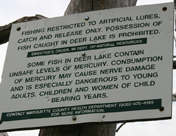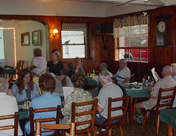Improving Fish Consumption Safety Through Community-Based Research
- Geoffrey B. Habron
- Associate Professor
- Department of Fisheries and Wildlife
- College of Agriculture and Natural Resources
- Department of Sociology
- College of Social Science

Restaurant sign advertising fresh fish, Brimley, Chippewa County.
Geoffrey Habron believes it is important not only to develop solutions to community problems and issues but also to involve community members throughout the research process. Dr. Habron got an early introduction to communitybased projects during his three-year experience with the Peace Corps in St. Lucia. He became interested in participatory action research and systems thinking while a graduate student. By integrating social and ecological factors in natural resource management, Habron aims, through his research, to improve natural resource and ecosystem management.

Site of angler interviews, Deer Lake, Marquette County. Sign warns of fish contamination.
Habron's research has focused on fisheries management, community-based adaptive watershed management, and fish consumption safety. His recently completed "Improving Fish Advisories in Michigan's Upper Peninsula" project integrated community-based research and outreach to improve the effectiveness of fish consumption advisories in four counties in the UP.
The project began in 2003, after the U.S. Agency for Toxic Substance and Disease Registry (ATSDR) identified concerns about the effectiveness of fish consumption advisories in the Upper Peninsula. The fish advisories appeared to be failing to provide adequate information on the benefits and risks of eating potentially contaminated fish, particularly with respect to minority populations.
With funding from ATSDR, Habron and his co-investigators worked with community members and local organizations to identify ways to improve the risk communication strategy in the UP. In partnership with Ronald Kinnunen of MSU Sea Grant; John Hesse of MSU Fisheries & Wildlife; graduate student Melanie Barbier, who is herself from the UP; and Joan Vinette of MSU Extension, Habron put together a research team with the local knowledge and on-the-ground contacts necessary for such a project to succeed. This was particularly important given issues of trust since Habron wasn't initially known to these UP communities. There were also logistical and distance challenges related to doing research so far from the MSU campus. To maximize information sharing, Habron maintained contact with the Michigan Inter-Tribal Council, which was doing similar research specifically targeting the UP's Native American population.
"Sustainability requires community members to learn to ask their own questions and to develop their own process that incorporates integrated planning, action and reflecting."
Geoffrey B. Habron

Graduate student Melanie Barbier (standing, center) distributes materials to community participants, Brownstone Inn, Alger County.
Community residents in Alger, Chippewa, Gogebic, and Marquette counties were asked about their knowledge of fish safety and how they preferred to receive fish advisories. In designing the research, Habron's team partnered with diverse, county-based public advisory committees that included women and children, as well as representatives from the charter boat business, the medical profession, and county health departments. Targeted focus groups were then held with women, youth, recreational fishers, and an environmental group, and similar community dinners were open to anyone. The sessions were held in community facilities such as restaurants, a public library, and courthouses.
Habron's team compared community views with existing environmental conditions to assess knowledge gaps regarding possible fish contamination. The research findings are helping Michigan fish consumption advisories improve their educational programs and activities on fish safety. As Ron Kinnunen, of MSU Sea Grant, noted, "It was a learning experience both ways."
This project well illustrates Habron's community-based approach to research and his view that "sustainability requires community members to learn to ask their own questions and to develop their own process that incorporates integrated planning, action and reflecting."
- Written by Cathy Gibson, University Outreach and Engagement